Key takeaways:
- Social isolation impacts mental and physical health, increasing anxiety and weakening the immune system.
- Establishing connections is crucial for recovery, as relationships provide emotional support and foster a sense of belonging.
- Building a support network can be initiated through small interactions and joining community activities, which can lead to meaningful connections.
- Vulnerability and self-compassion are vital for overcoming isolation and developing deeper relationships with others.
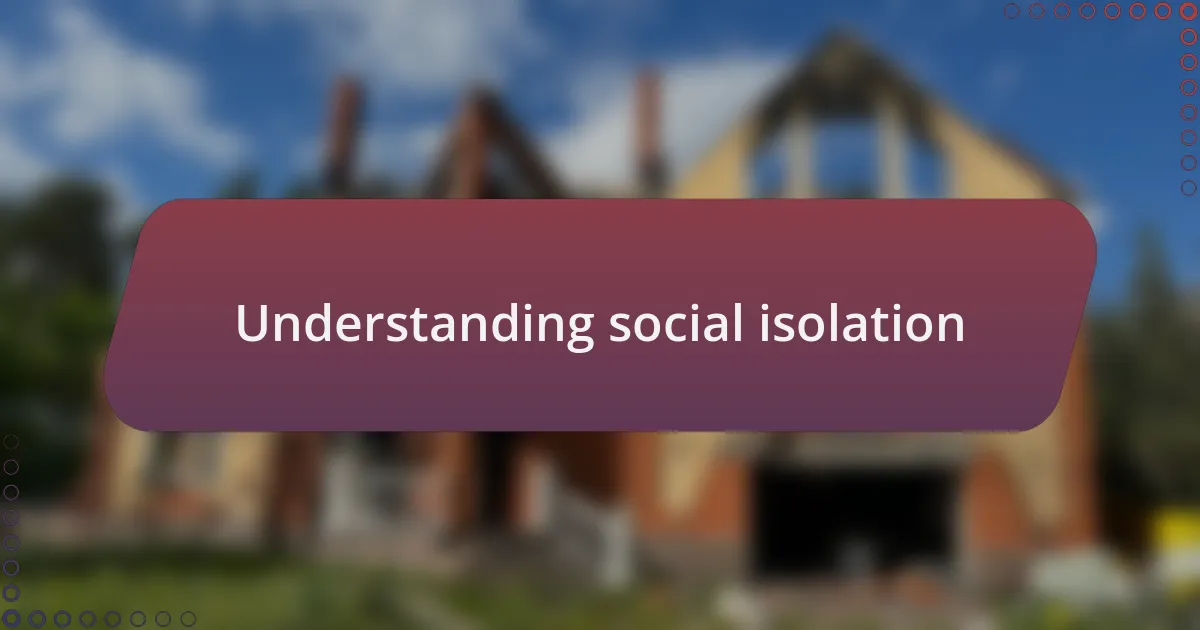
Understanding social isolation
Social isolation can often feel like being trapped in a bubble, where the outside world seems distant and unreachable. I vividly remember a period in my life when I experienced this profound sense of loneliness. It left me wondering: how could I feel so cut off, even when surrounded by people? It’s an intense paradox that many of us grapple with silently.
Diving deeper, it’s essential to recognize how social isolation can impact our mental and emotional health. For instance, during my struggle, I found that the lack of meaningful connections heightened my anxiety and deepened my sadness. I often questioned what it meant to be truly connected to someone. This reflection led me to realize that, while physical presence is valuable, emotional support is the true cornerstone of human interaction.
Feeling alone in a crowd can create a vicious cycle, making it challenging to reach out when you need support. I’ll never forget a friend’s simple gesture during my isolated moments—a text checking in, just asking how I was doing. It was a small act, but it sparked a realization within me: that even the smallest connection could break through the barriers of isolation. Have you ever felt this way? I encourage you to think about how those little moments of connection can make the biggest difference.
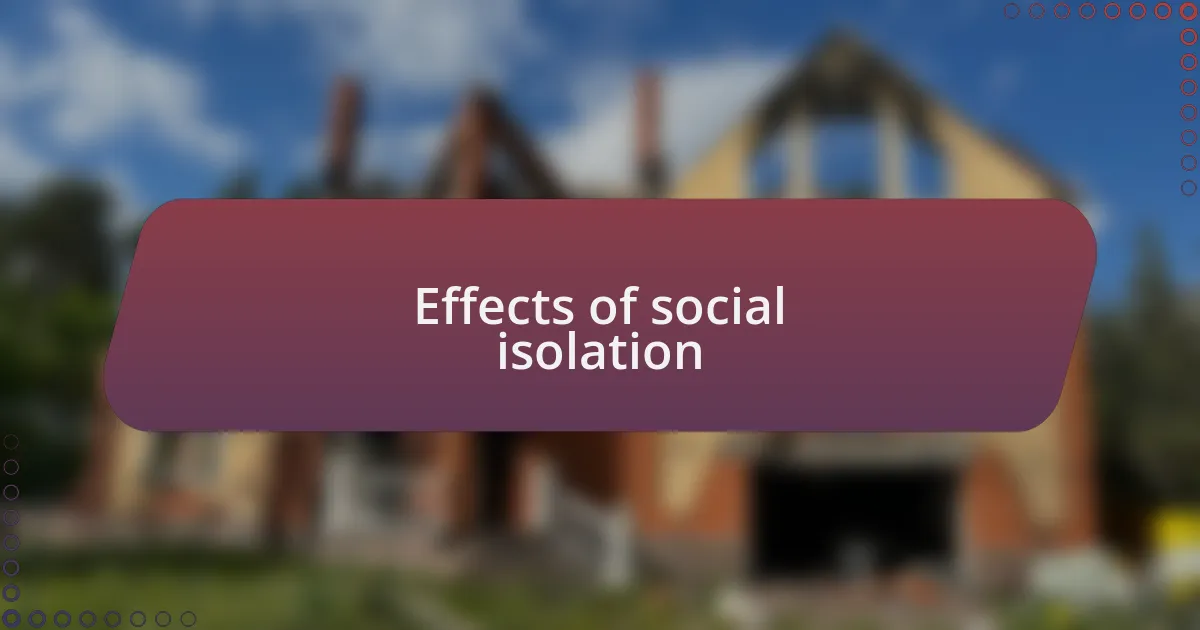
Effects of social isolation
Social isolation often leads to increased feelings of anxiety and depression, as it strips away the comforting buffer of human connection. I can still recall the days when simply getting out of bed felt like climbing a mountain. In those moments, I found myself trapped in a cycle of negative thoughts, questioning my worth and yearning for the companionship I was missing. Can you relate to that heaviness?
Moreover, the impact of social isolation extends beyond mental health; it can also affect physical well-being. During a particularly lonely period in my life, I noticed that my immune system took a hit; I caught colds more easily and struggled to shake off illnesses. The irony didn’t escape me; the very thing that kept me inward was also keeping me physically weaker. It’s remarkable how our emotional state can directly correlate with our physical health, don’t you think?
Interestingly, social isolation can alter our perspectives and even our identities. As I distanced myself from friends and family, I began to see the world more pessimistically. My interests waned, and I lost touch with what once brought me joy. It made me ponder: how much of our identity is shaped by our relationships? I’ve learned that being socially connected can enrich our lives in ways we often overlook, reinforcing the need for those cherished interactions.
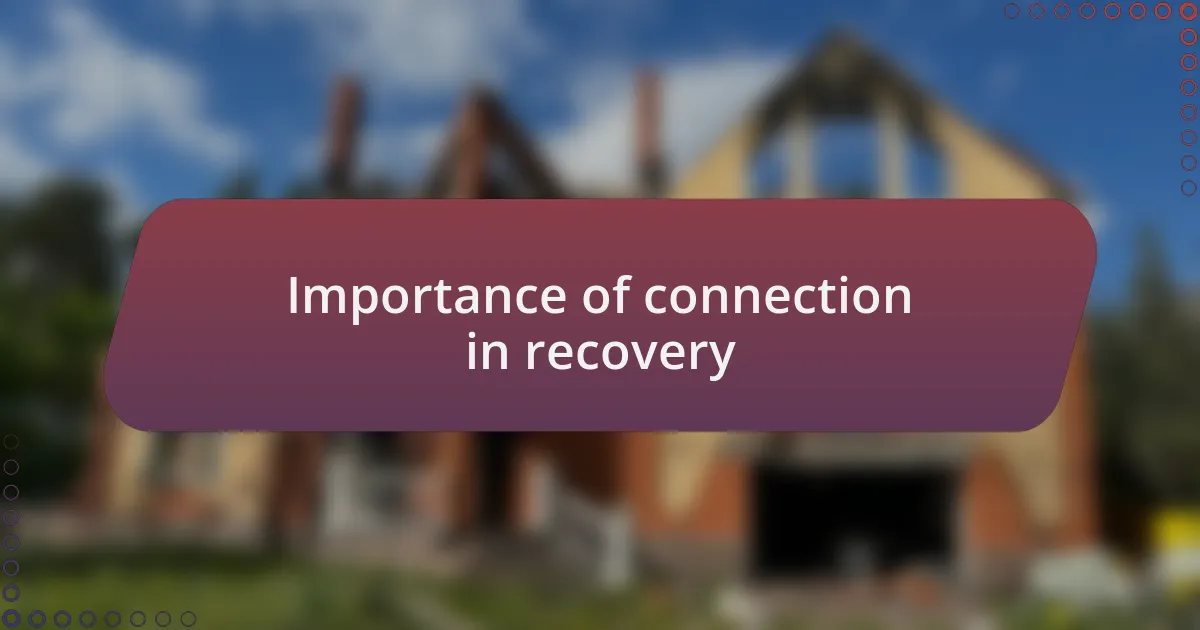
Importance of connection in recovery
Establishing connections during recovery is essential, as these relationships can act as lifelines. I remember a time when I decided to reach out to an old friend after months of silence. The warmth of our conversation rekindled a sense of belonging, reminding me that I’m not alone in my struggles. Have you ever experienced that magical moment when a simple chat lifts your spirits?
Moreover, the supportive presence of others can significantly influence our journey toward healing. I was fortunate to join a local group focused on shared experiences, where participants discussed their ups and downs openly. Each story shared resonated deeply with me, fostering empathy and understanding. I often left those meetings feeling lighter, carrying newfound hope that I didn’t think was possible before.
Building connections isn’t just about having someone to talk to; it’s about creating a community that nurtures growth and resilience. I vividly recall volunteering at a community center, where my appreciation for teamwork grew. Working alongside others gave me a sense of purpose and showed me the strength that comes from collaboration. Can you see how being part of something larger can empower us on our paths to recovery?
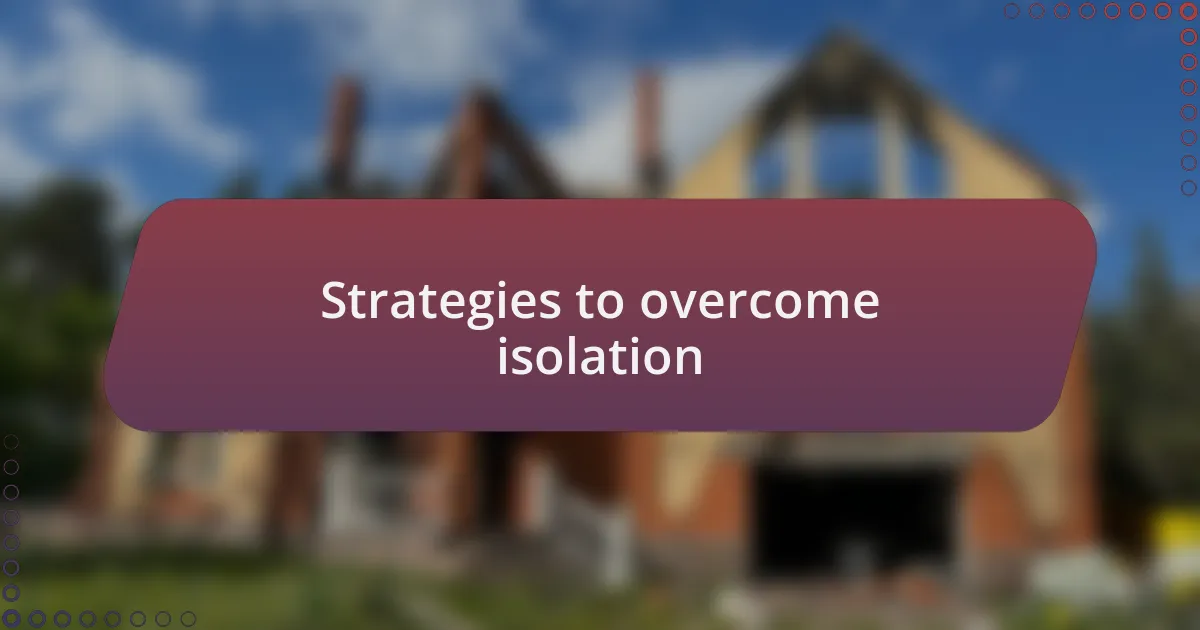
Strategies to overcome isolation
The first step to overcoming isolation, in my experience, is to actively seek social interactions, even when the urge to withdraw is strong. I recall a tough period when just leaving my home felt overwhelming. To combat this, I made a small commitment to join a weekly book club. It’s amazing how discussing a shared interest can break down walls and create connections, turning isolation into inspiring dialogue. Have you ever noticed how an engaging topic can light up a conversation?
Another effective strategy is to harness the power of technology. During my lonely days, I found that virtual meet-ups with friends made all the difference. We’d have video calls where we could share our lives, offering support and laughter from the comfort of our own homes. It made me realize that distance doesn’t have to define our relationships. Have you tried using social media or apps to reach out to loved ones?
Lastly, I discovered that exploring new hobbies can introduce you to fresh social circles. I took up painting after a friend encouraged me, and joining a local art class was transformative. The connections I made with fellow artists became a source of motivation and joy. Isn’t it fascinating how stepping out of your comfort zone can lead to new friendships and a sense of belonging?
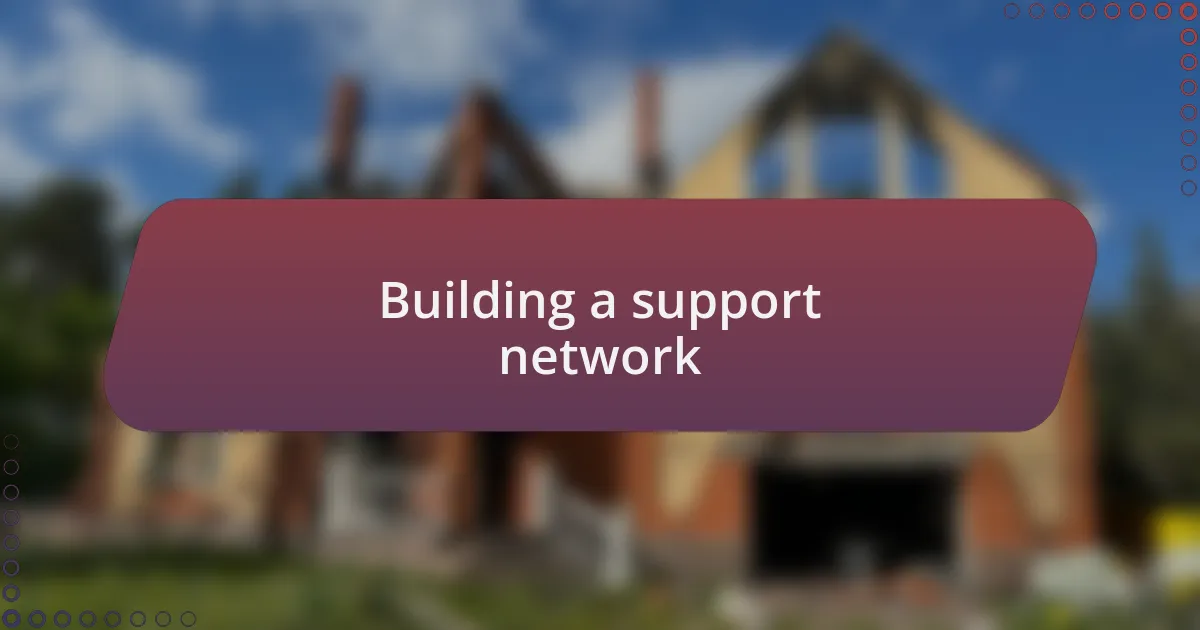
Building a support network
Building a support network starts with being proactive. I distinctly remember my earlier days of isolation, feeling like I was in a bubble. To break free, I reached out to neighbors and acquaintances, inviting them for casual coffee chats. Those seemingly simple interactions began to weave a web of connection that made me feel less alone. Have you ever thought about how a cup of coffee can open the door to new relationships?
Joining local groups or community organizations can also create a sense of belonging and expand your circle. When I joined a community gardening project, I didn’t just learn about plants; I found friends who shared my passion for nature. The process of working side by side, nurturing both the garden and our connections, brought an indescribable joy that I hadn’t expected. Isn’t it incredible how shared activities can foster bonds that last?
Moreover, don’t hesitate to lean on existing relationships. I turned to old friends, reaching out for support during my toughest moments. Reconnecting with them not only refreshed our friendship but reinforced that I wasn’t navigating life’s challenges alone. This emphasized for me that vulnerability is a strength and a pathway to more meaningful connections. Have you considered how reaching out to a familiar face could ease your path through isolation?
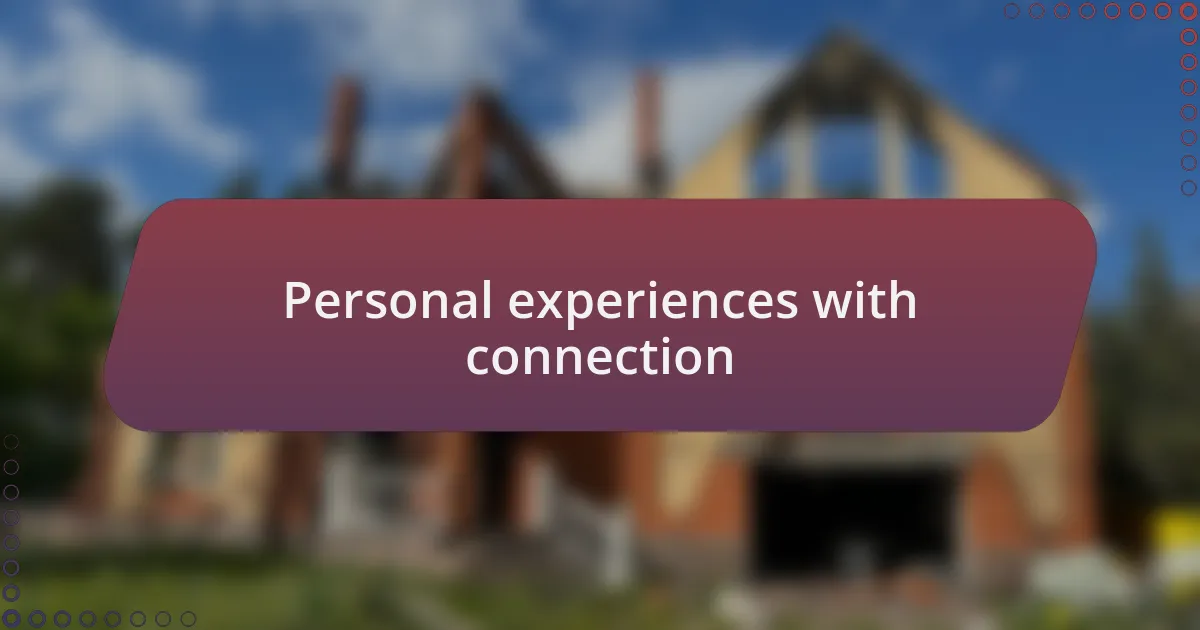
Personal experiences with connection
Finding meaningful connections during my struggle with isolation wasn’t always easy, but I learned that sometimes, the most profound relationships start in unexpected places. I remember volunteering at a local shelter, initially thinking it was just a way to occupy my time. However, I soon discovered a community of compassionate individuals who not only shared the experience of giving back but also provided a support system that felt like family. Have you ever felt a deeper connection with strangers through a shared purpose?
In one memorable moment, I participated in a small group discussion about overcoming personal challenges. Listening to others share their stories resonated deeply with me; their vulnerabilities reminded me that I wasn’t alone in my experiences. It struck me just how powerful it is to find solace in shared struggles. Could opening up about our challenges bring us closer together?
Also, I started journaling about my feelings and then sharing snippets with others I trusted. This practice turned out to be more than just written words; it became a bridge that connected me to those who resonated with my experiences. Revealing my thoughts led to deep discussions that reinforced my belief in the strength of connection. Have you considered how expressing yourself could unlock connections you never knew were there?
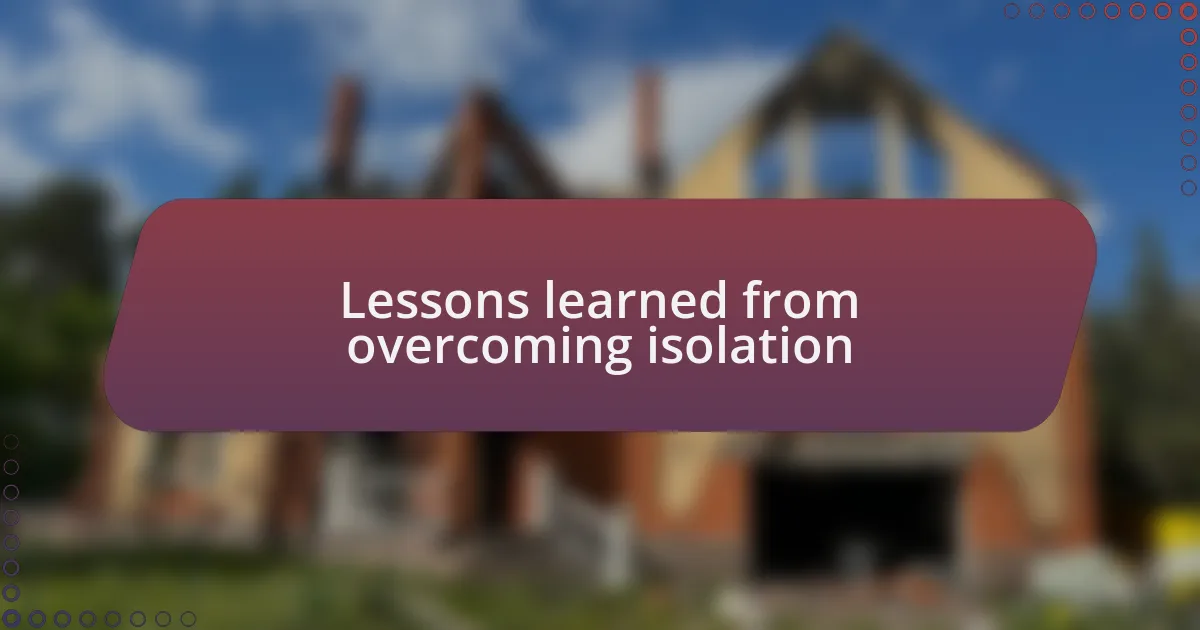
Lessons learned from overcoming isolation
Lessons learned from overcoming isolation
One key lesson I discovered was the importance of vulnerability. When I finally let my guard down and shared my struggles with a close friend, I was surprised by the weight that lifted off my shoulders. It made me realize that being open about our feelings can spark connections that might otherwise remain hidden. Have you ever experienced this sense of relief from simply speaking your truth?
Another insight was recognizing the value of diverse interactions. I found that engaging with people from different walks of life enriched my perspective and helped combat feelings of isolation. I vividly remember a conversation with an elderly neighbor who shared stories from his younger days. His experiences not only entertained me but made me appreciate the beauty of life’s journey. Have you stopped to listen to the stories of those around you?
Lastly, I understood that self-compassion is essential. During my bouts of loneliness, I learned to treat myself with the same kindness I offered to others. A moment that stands out was when I forgave myself for not being “social enough.” Embracing my own imperfections allowed me to move forward, reinforcing the idea that everyone has times of struggle. Have you taken a moment to be gentle with yourself on your journey?